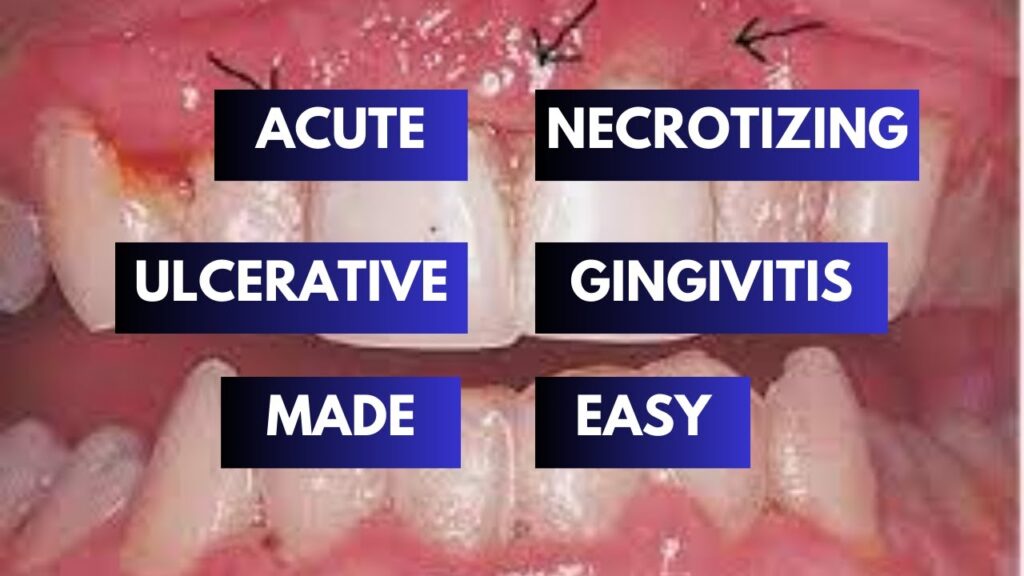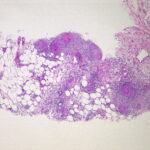Acute necrotizing ulcerative gingivitis (ANUG), commonly referred to as trench mouth, is a severe bacterial infection of the gums. Characterized by painful ulcers, necrosis, and halitosis, ANUG is associated with poor oral hygiene, stress, smoking, and immunosuppression. Left untreated, it can lead to periodontal destruction and systemic complications.

Pathophysiology of ANUG
ANUG is caused by an overgrowth of anaerobic bacteria, particularly Fusobacterium, Treponema, and Prevotella species. These bacteria invade the gingival tissue, leading to necrosis and inflammation.
Risk Factors
- Poor Oral Hygiene: Increases bacterial colonization.
- Smoking & Tobacco Use: Reduces blood supply to the gums.
- High Stress Levels: Weakens immune response.
- Malnutrition: Leads to impaired tissue healing.
- Immunosuppression: HIV, diabetes, and chemotherapy increase susceptibility.
Clinical Symptoms
- Severe Gum Pain: Sudden onset with sensitivity.
- Ulcerated and Necrotic Gingiva: Commonly affects interdental papillae.
- Spontaneous Bleeding: Even with minimal contact.
- Pseudomembrane Formation: Grayish-white film over affected gums.
- Halitosis (Foul Breath): Due to bacterial metabolism.
- Lymphadenopathy: Swollen and tender lymph nodes.
Diagnosis
- Clinical Examination: Visual inspection of ulcerated and necrotic gum tissue.
- Bacterial Culture & Microscopy: Identifies causative anaerobic bacteria.
- Complete Blood Count (CBC): Assesses immune function and infection severity.
- Radiographic Imaging: Detects potential bone involvement.
Treatment Strategies
1. Professional Debridement
- Mechanical removal of necrotic tissue and plaque.
- Chlorhexidine or hydrogen peroxide rinses for antimicrobial action.
2. Antibiotic Therapy
- First-line antibiotics: Metronidazole, amoxicillin, or clindamycin.
- Broad-spectrum coverage: In severe cases or immunocompromised patients.
3. Pain Management & Symptomatic Relief
- Nonsteroidal anti-inflammatory drugs (NSAIDs) for pain control.
- Topical anesthetics like benzocaine gel for local relief.
4. Oral Hygiene Improvement
- Soft-bristled toothbrush and antimicrobial mouthwash.
- Regular professional cleanings and follow-ups.
Prevention Strategies
- Maintaining Proper Oral Hygiene: Brushing twice daily and flossing.
- Quitting Smoking: Enhances gum health and healing.
- Managing Stress: Reduces risk of exacerbations.
- Balanced Nutrition: Ensures adequate vitamin and mineral intake.
- Regular Dental Check-ups: Early detection and intervention.
Prognosis and Complications
Without treatment, ANUG can lead to:
- Chronic Periodontitis: Progression to severe gum disease.
- Noma (Cancrum Oris): Rapid tissue destruction in severe cases.
- Tooth Loss: Due to periodontal damage.
- Systemic Infection: Bacteria spreading to other organs.
Acute necrotizing ulcerative gingivitis is a serious dental infection requiring prompt intervention. Proper oral care, lifestyle modifications, and timely medical treatment significantly reduce complications and improve oral health.

